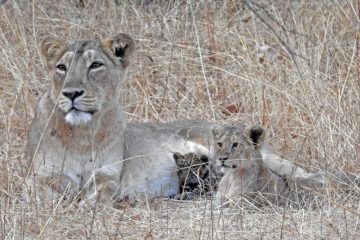Cara Giaimo in The New York Times:
 The lions and leopards of Gir National Park, in Gujarat, India, normally do not get along. “They compete with each other” for space and food, said Stotra Chakrabarti, a postdoctoral researcher at the University of Minnesota who studies animal behavior. “They are at perpetual odds.” But about a year ago, a young lioness in the park put this enmity aside. She adopted a baby leopard. The 2-month-old cub — all fuzzy ears and blue eyes — was adorable, and the lioness spent weeks nursing, feeding and caring for him until he died. She treated him as if one of her own two sons, who were about the same age. This was a rare case of cross-species adoption in the wild, and the only documented example involving animals that are normally strong competitors, Dr. Chakrabarti said. He and others detailed the case last week in the ecology journal Ecosphere. The paper’s authors, who also included a conservation officer and a park ranger, first spotted the motley crew in late December 2018, hanging out near a freshly killed nilgai antelope. Initially, they thought the association would be brief; a lioness in Tanzania’s Ngorongoro Conservation Area had once been observed nursing a leopard cub, but only for a day before the two separated. “But this went on,” Dr. Chakrabarti said.
The lions and leopards of Gir National Park, in Gujarat, India, normally do not get along. “They compete with each other” for space and food, said Stotra Chakrabarti, a postdoctoral researcher at the University of Minnesota who studies animal behavior. “They are at perpetual odds.” But about a year ago, a young lioness in the park put this enmity aside. She adopted a baby leopard. The 2-month-old cub — all fuzzy ears and blue eyes — was adorable, and the lioness spent weeks nursing, feeding and caring for him until he died. She treated him as if one of her own two sons, who were about the same age. This was a rare case of cross-species adoption in the wild, and the only documented example involving animals that are normally strong competitors, Dr. Chakrabarti said. He and others detailed the case last week in the ecology journal Ecosphere. The paper’s authors, who also included a conservation officer and a park ranger, first spotted the motley crew in late December 2018, hanging out near a freshly killed nilgai antelope. Initially, they thought the association would be brief; a lioness in Tanzania’s Ngorongoro Conservation Area had once been observed nursing a leopard cub, but only for a day before the two separated. “But this went on,” Dr. Chakrabarti said.
For a month and a half, the team watched the mother lion, her two cubs and the leopard roam Gir National Park. “The lioness took care of him like one of her own,” nursing him and sharing meat that she hunted, Dr. Chakrabarti said. His new siblings, too, were welcoming, playing with their spotty new pal and occasionally following him up trees. In one photo, the leopard pounces on the head of one of his adoptive brothers, who is almost twice his size and clearly a good sport. “It looked like two big cubs and one tiny runt of the litter,” Dr. Chakrabarti said. He has been studying the park’s lions for nearly seven years. This unlikely association “was surely the most ‘wow’ moment I’ve come across,” Dr. Chakrabarti said. His fellow researchers with an Asiatic lion conservation project in India, some who have been watching the big cats for decades, had “also not seen anything like this,” he said.
More here.
